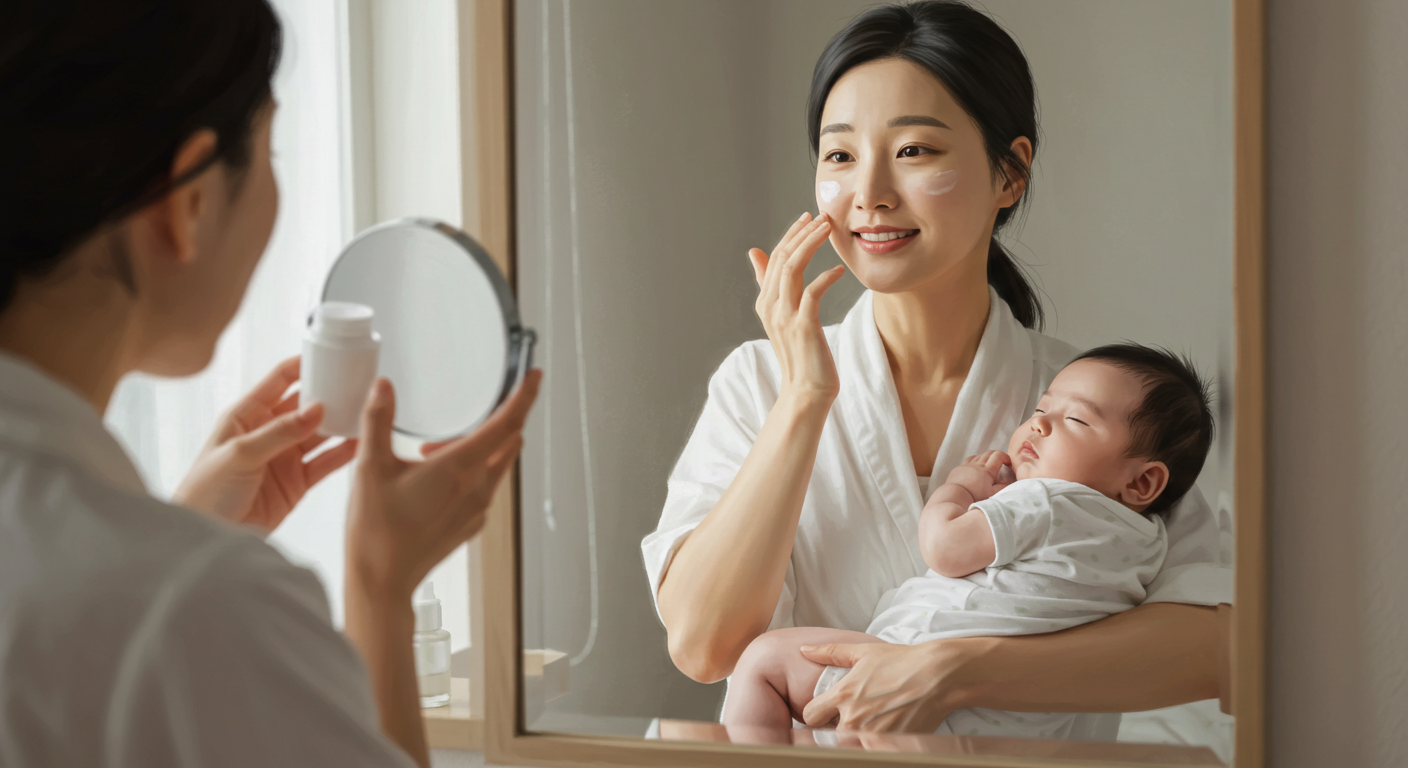After nine months of waiting, your little one is finally here! But in between the endless diaper changes and sleepless nights, you might catch a glimpse of yourself in the mirror and think, "What happened to my skin?" Dark spots, unfamiliar breakouts, and a new level of dryness—it can be disheartening. I've been there! Many women actually experience a "pregnancy glow," only to have their skin become unpredictable after birth. But please don't worry. This is a very natural response from your body. Today, we'll talk all about postpartum skin changes and how you can gently care for your skin during this new chapter. 😊
Why Does Skin Go Haywire After Birth? 🤔
The number one culprit is a dramatic hormonal shift. During pregnancy, your body is flooded with estrogen and progesterone, which can make your skin look plump and radiant. After you give birth, these hormone levels plummet, causing your skin to lose its balance and leading to a host of new issues.
- Hormone Crash: Throws your skin's oil and water balance out of whack and weakens its natural barrier.
- Sleep Deprivation & Stress: The exhaustion from caring for a newborn slows down your skin's natural repair and regeneration process.
- Dehydration & Nutrient Loss: Especially if you're breastfeeding, your body is giving a lot of its water and nutrients to the baby, leaving less for your skin.
Around three months postpartum, many women are shocked to see clumps of hair falling out in the shower. This is called postpartum telogen effluvium. It’s also caused by the same drop in hormones. The good news? It's almost always temporary and your hair growth should return to its normal cycle within 6 to 12 months.
Common Postpartum Skin Concerns 📊
Most new moms experience at least one of these common issues. Seeing them listed out might bring some comfort that you are definitely not alone!
| Skin Concern | What It Looks Like | Main Cause |
|---|---|---|
| Melasma / Dark Patches | Brown or grayish patches on the cheeks, forehead, or upper lip. | Hormones, Sun Exposure |
| Acne & Breakouts | Pimples and inflammation, often around the chin and jawline. | Oil/Water Imbalance |
| Stretch Marks | Red, purple, or white lines on the belly, thighs, or breasts. | Rapid Skin Stretching |
| Dryness & Itchiness | Flaky, dull skin that feels tight and sometimes itchy. | Weakened Skin Barrier |
Get Your Glow Back: Simple Skincare Tips ✨
When you're exhausted, a 10-step skincare routine is the last thing on your mind. So let's skip the complicated stuff! Here are the minimal, yet most effective, tips for busy moms.
- Go Back to Basics: Your skin is sensitive right now, so be gentle. Use a mild, hydrating cleanser and focus heavily on moisturizing. Products with ceramides and hyaluronic acid are fantastic for rebuilding your skin's weakened barrier.
- Sunscreen is Non-Negotiable: Melasma and dark spots will get darker with sun exposure. Make it a habit to apply sunscreen every single day, even if you're staying indoors. Dermatologists agree it's the single best anti-aging and anti-pigmentation tool.
- Care From the Inside Out: What you put in your body is just as important as what you put on your skin. Aim to drink plenty of water throughout the day (at least 8 glasses) and try to eat foods rich in Vitamin C, like fruits and vegetables, to help brighten your skin.
- Get Rest & Give Yourself Grace: This is the hardest but most important tip. Try to nap when the baby naps to catch up on sleep. And let go of the need to do everything perfectly. A rested mom is great for your mental health and your skin's health!
If you have severe acne or persistent irritation, please don't hesitate to see a dermatologist. It's especially important to consult a doctor before using any strong active ingredients (like retinoids) or getting skin treatments, as some may not be safe for breastfeeding.
Postpartum Skin Recovery Plan
Frequently Asked Questions ❓
Your body performed a miracle by growing and birthing your baby. These skin changes are just a part of that incredible story. Let go of any pressure to "bounce back" quickly. As you care for your newborn, remember to also care for yourself. Your body will heal and rebalance in its own time. You've got this! Any other questions? Feel free to ask in the comments. 😊



